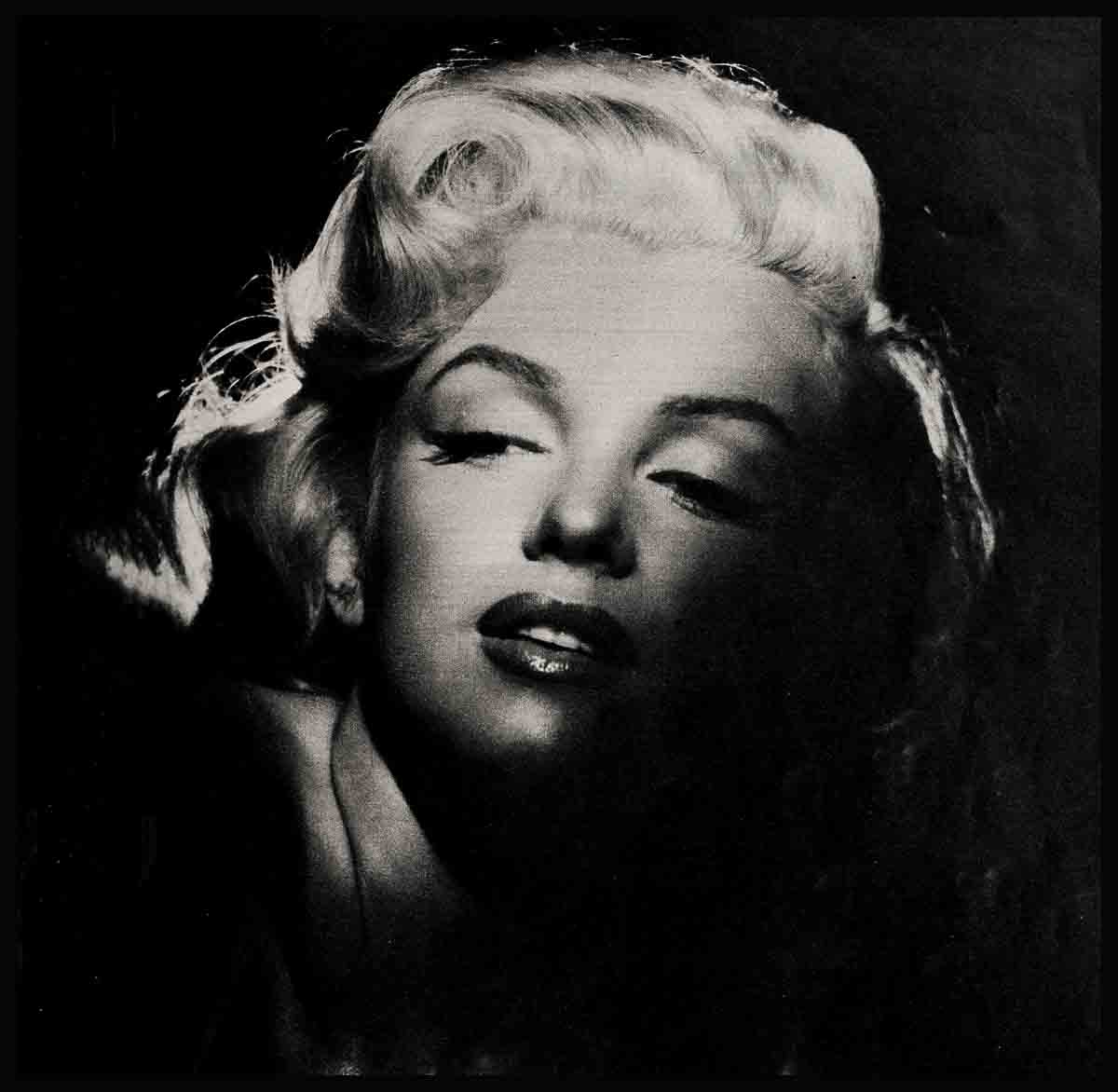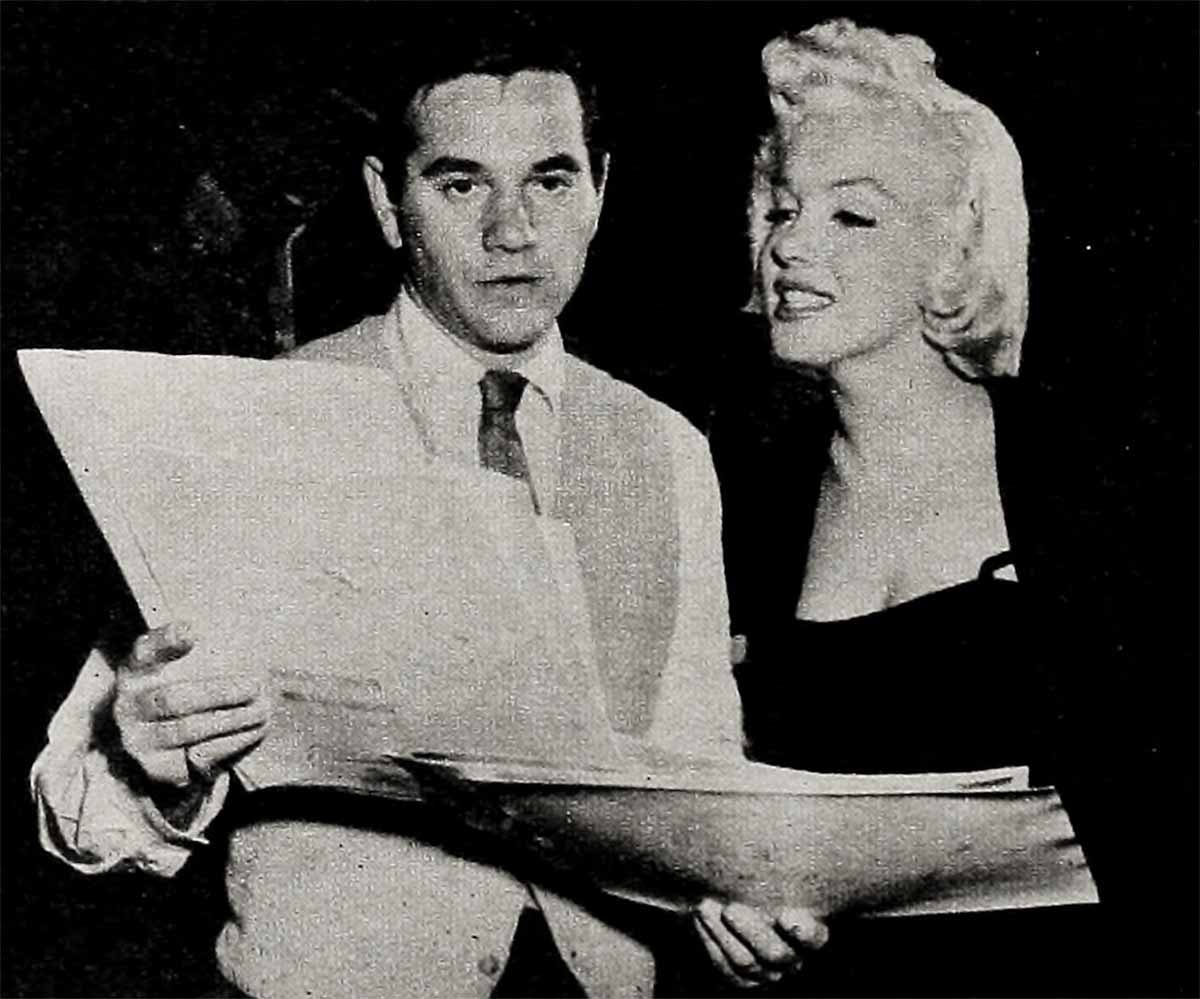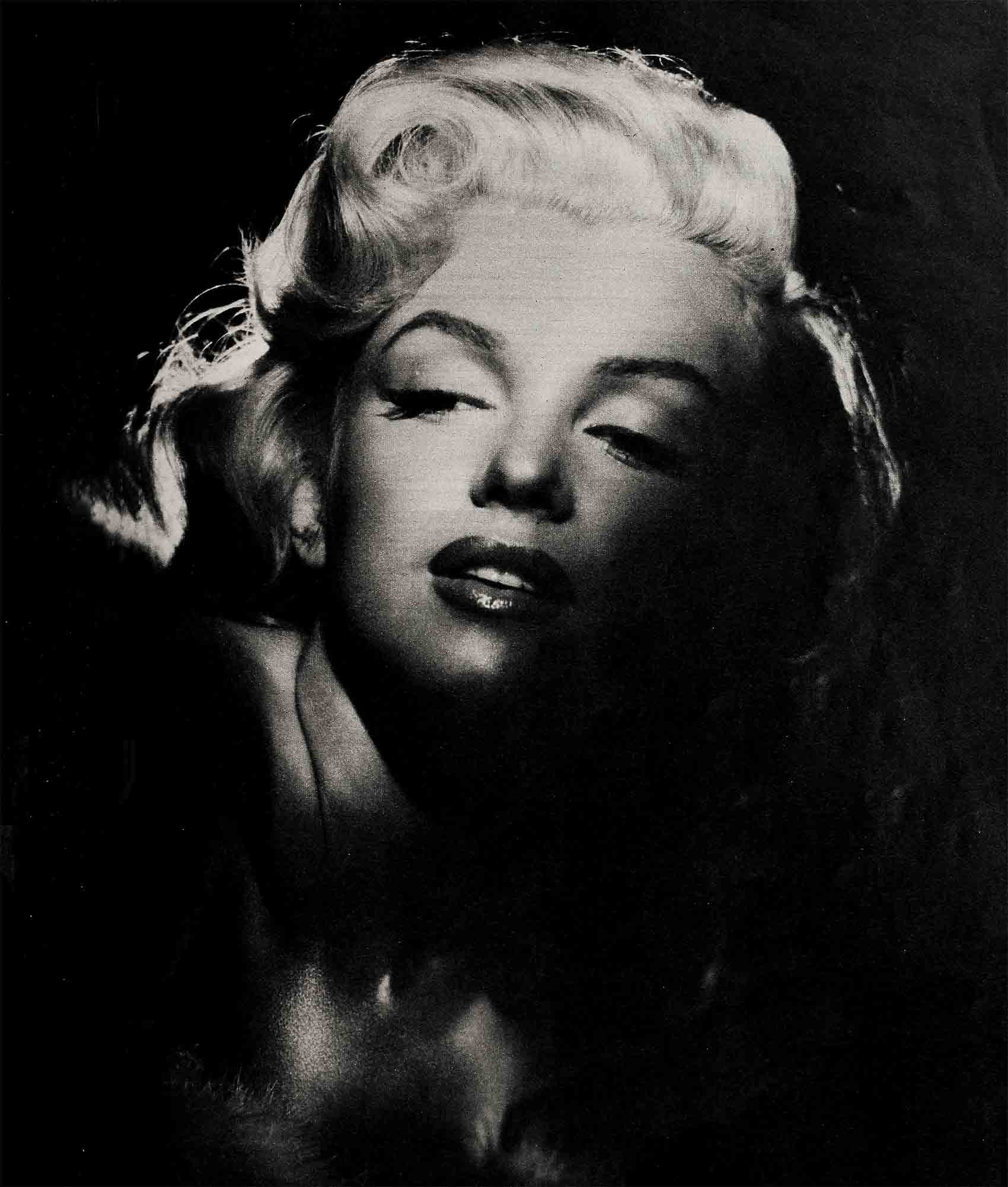
The Storm About Marilyn Monroe
What is happening to Marilyn Monroe?
Has she reconciled with Joe DiMaggio?
Has she found a new lover in the east whose identity remains a coveted secret?
Is her relationship with Milton Greene, photographer and vice-president of Marilyn Monroe Productions, burgeoning into something more than a business affair?
Has success gone to her head?
Is she really going to play the nightclub circuit in Las Vegas?
These are just a few of the questions about Marilyn that Hollywood has been asking.
This blonde beauty whose rags-to-riches saga was once an open book to the entire movie colony, has now become a mysterious and controversial figure.
Executives who once spoke of her knowingly and glowingly, say now that she is misguided, cold-blooded and greedy.
“I once thought,” says a friend of Johnny Hyde, the agent who befriended Marilyn in her struggling years, “that this girl had a good head on her shoulders, the kind of steady head success would never turn. Now I’m not so sure.
“I can’t understand why Marilyn fought with her studio. What made her turn down a new contract at $100,000 a picture? A few years ago the girl was starving. That’s why she had to pose for those calendar pictures.
“Now, she’s ready to start her own company. What does she know about producing pictures? I can’t help feeling that she has been the victim of bad advice.”
One of the few women in Hollywood who has worked with Marilyn closely for many years, is similarly puzzled, but about Marilyn’s relationship with Joe DiMaggio.
“I have come to the conclusion,” she said, “that Marilyn Monroe doesn’t know her own mind. I can’t tell you how unhappy she was while she was married to DiMaggio. She felt closed in, a prisoner in her own,house. She felt that Joe never would come to understand either her or show business. Her months of marriage to DiMaggio, despite all the fairy tales, were months of misery.
“When she divorced Joe, I know she felt as though a great weight had been lifted from her heart. She and Joe had nothing in common. She told me this a dozen times if she told me once.
“Marilyn has had very few friends in her life. Because of her sex appeal, women are afraid of her. The men she has known usually have been instrumental in helping her career.
“Joe was not one of these and she let him go. No sooner was he gone than they started seeing each other again. They were more lovey-dovey after the divorce than before. Not only that. When Marilyn flew back east, so did Joe. They met in Boston with Joe’s brother and went out together.
“When Marilyn moved down to New York and into the Gladstone Hotel, Joe wasn’t far behind. The columnists said he was serving her soup in bed. When Marilyn was asked if this meant a reconciliation, she said, ‘No, but we’re still good friends.’ ”
What does all this mean? Does anyone really know where Marilyn is going? What does she want? What sort of woman has she become?
Messrs. Ziff and Friedman, entrepreneurs of The Last Frontier in Las Vegas, telephoned Marilyn in New York and offered her $40,000 a week to appear in their casino.
“We’ll build a magnificent show around you,” they told her. “All you’ll have to do is a couple of numbers.”
Marilyn’s reported answer: “Thank you very much. But Im sorry. I get frightened easily in front of a lot of people.”

One of the grips who worked on The Seven Year Itch set with Monroe, was asked if he’d noted any change in her behavior.
“I’ve been on a lot of pictures with her,” he said, “and I must say I was surprised when she ordered a closed set. Didn’t want any visitors, didn’t want any reporters. That was the tip-off, at least to me. She was getting a little big in the head.
“Another thing, she had Bob Alton, the dance director taken off Show Business. Alton is one of the greatest in the business. Discovered Gene Kelly, Van Johnson, Sheree North, on and on. Marilyn said he wouldn’t do for her. So they got her Jack Cole. Jack is a fine dancer. He did what he could with Marilyn. But let’s face it, this kid takes time. It didn’t go easy.
“I’ve seen a lot of players in my time. Tell ’em they’re getting conceited, and they call you a liar. But gradually success has a way of swelling the head. It certainly has swelled Marilyn’s, or she wouldn’t have gone off half-cocked.”
Billy Wilder, who directed her in The Seven Year Itch, says, “Working with Marilyn is not the easiest thing in the world, but it was one of the great experiences of my life . . . I have a feeling that this picture helped her in formulating an idea of what she herself is all about.”
Milton Greene, the photographer who has been closer to Marilyn these last few months than any other individual, feels strongly that his business associate is being unfairly maligned.
“All she wants,” Greene explains, “is to have something to say about the roles she plays. She has nothing against 20th Century-Fox. She agrees that the studio has been very good to her. It’s only normal for an actress to want to grow. The better the parts, the better the development. She’d like to make an outside picture occasionally. She’d like to control a little of her own destiny. Maybe she’ll fall on her face. Maybe she won’t. All she’s asking for is the chance. Our lawyer contends that she’s a free agent. The studio contends that she’s under contract for another three and a half years. Eventually the thing will be settled.”
When Darryl Zanuck was in London several months ago—before Marilyn’s contract fight took place—the 20th Century-Fox production chief was asked about Monroe.
“Sometimes,” he volunteered, “publicity can be more damaging than helpful. I mean it can grow and grow and get out of hand. Then you have to fight to control it. That’s what happened with Marilyn Monroe. We gave her the publicity buildup at the beginning. But now it has gone too far. We have to stop it. Before the public gets sick of her. As for the girl herself, well, she’s temperamental. She’s not very fit, either. Wave a script in front of her face and she comes down with a cold.”

An executive at RCA Victor says, “Not too long ago we released a couple of Marilyn Monroe records, ‘Heat Wave’ and ‘After You Get What You Want, You Don’t Want It.’ In my opinion this girl can become one of the most popular recording artists in America. She always has been very cooperative. That is, outside of being late. She’s always an hour or two hours late for every appointment, but that’s just a personal idiosyncrasy. When you want to see her at three P.M., you say, ‘Marilyn, let’s meet at noon.”
These statements reveal the conflict now raging around Marilyn. One camp says she is a sensible girl who knows what she wants and is determined to get it. The other side insists that she’s all mixed up.
There is plenty of evidence that Marilyn, at this point, is muddled and confused.
When she married DiMaggio, she said, “I’d like most to have a baby.” upon she threw herself into her career with renewed vigor while husband DiMaggio stayed at home watching television and looking after the house.
No doubt Marilyn does want a baby, maybe many babies, but given the choice of wifehood or movie career, she will take movie career every time.
Why? Well, perhaps the answer lies deep in her background. She never had a happy home life. There is nothing sentimental about home to her. Family, home, mother, father, the relatives everyone takes for granted—to Marilyn Monroe are unknown quantities.
She never has seen her father. She knows nothing about him, where he lives or whether he’s alive or dead. As for her mother, the poor woman has spent much of her life in and out of sanitaria. Therefore, Marilyn hates to recall her youth.
To her what counts most is her relatively new success, the fact that she has pulled herself up by her own bootstraps.
Over the years Marilyn has demonstrated an amazing facility for connecting herself with people who will do her the most good.
Johnny Hyde, her first true love, was one of the most influential agents in Hollywood. Joe Schenck, one of the founding fathers of 20th Century-Fox, is still one of the great powers,in the motion picture industry. Natasha Lytess, Marilyn’s dramatics coach, is said to be largely responsible for Marilyn’s superb performance in The Seven Year Itch which, incidentally, is the finest picture Monroe has ever been in. Columnist Sidney Skolsky has given Marilyn more space than any other single Hollywood star.
What Milton Greene and Frank Delaney, her new associates, will do for Marilyn remains to be seen.
“I wonder,” remarked an actress who dislikes Marilyn, “if she would still be fooling around with DiMaggio if the studio had met her terms.
“I would like to suggest the possibility,” this actress continues, “that in Marilyn Monroe you are seeing the shrewdest cookie Hollywood has ever produced. No girl without brains can reach the heights this baby has scaled. She has played all the angles. She has made the most of her talents.
“She has become a big name. She can grab off a millionaire any time she wants. DiMaggio is begging to take her back. He’s a lonely man with a few bucks salted away and no career. Marilyn’s a good thing for him to show off. It balms his ego. But Marilyn is much too smart to be used.
“Perhaps I’m being hard on the girl, but I think if you study her history you will find that she has always received much more than she has given. For example, the publicity she got when she married Joe and then divorced him—you can hardly beat that. The honeymoon in Japan. The divorce scene on their front lawn. All of that did her no harm.
“The only wrong move she made in her career was to turn down that new studio contract. A girl who has had nothing wants more than $200,000 a year. Why? To the public it makes no sense. ‘Is Marilyn greedy?’ her fans want to know. ‘Is she unwise? What’s the score?’
“If she likes DiMaggio so much, if she loves staying in hotels watching television with him, why did she divorce him in the first place? Maybe she really didn’t try to make the marriage work.
“There was a time when the international public regarded Marilyn Monroe as a twentieth century Cinderella. Now she has gone and destroyed the dream and the whole build-up. It’s the first mistake she has made.”
Marilyn Monroe’s detractors insist that the girl has lost all sense of proportion, that dozens of persons are whispering constant and nonsensical flatteries in her ear and that she has
momentarily lost the common sense she had shown for so long. The basic truth (and this is apparent in her fan mail) is that through her strange behavior she has disenchanted thousands of fans who for a long time felt that she had conquered adversity because she was endowed with the virtues of honor, selflessness and love.
THE END
—BY STEVE CRONIN
It is a quote. MODERN SCREEN MAGAZINE MAY 1955





No Comments